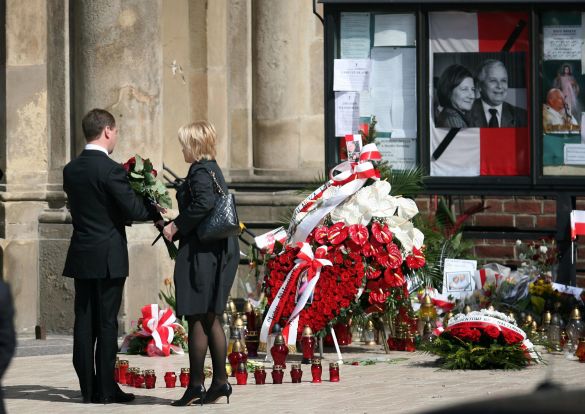
The Polish Revelation for Russia – and the Latin American Dream
Publication: Eurasia Daily Monitor Volume: 7 Issue: 75
By:

Two distinct and remarkably dissimilar international events developed in parallel in Russian foreign policy over the last two weeks: rapprochement with Poland and networking in Latin America. The latter started with Prime Minister, Vladimir Putin’s, visit to Venezuela and continued with President, Dmitry Medvedev’s, official visit to Argentina and with the Brazil-Russia-India-China (BRIC) summit in Brazil. The former started with the ceremony at Katyn, the site of the execution of thousands of Polish officers in 1940, attended by Putin and his Polish counterpart, Donald Tusk, and continued with the extraordinary efforts necessitated by the death of Polish President, Lech Kaczynski, his wife, and dozens of Polish politicians and veterans in the air crash also on their way to Katyn. The difference between these two developments is determined not by the distance between Poland and Latin America, but by their diverging character, since one is driven by ambition and pretence, and another –by sober pragmatism and uncharacteristic humility.
The main point in building “strategic relations” with Latin America became clear in Medvedev’s remark that “if someone does happen to be bothered by it, frankly, we do not care,” which inevitably made headlines in the Russian media (Nezavisimaya Gazeta, April 16). He added: “My impression these days is that rational people are in the White House,” but could not camouflage the rather flimsy rationale for Moscow’s policy (Vedomosti, April 16). Indeed, the ambition to “befriend” Hugo Chavez and return to Cuba belongs more to the last years of Putin’s “era,” when Moscow sought to demonstrate its international prestige restored by the inflow of petro-revenues. Now arms export contracts are conditional on granting non-commercial credits and the projects to jointly develop oilfields and construct nuclear power plants require large-scale investment from Russian companies, while its own energy sector suffers from sustained under-investment (Kommersant, April 5).
The futility of Russian ambition to secure a place among the fast-rising powers is particularly obvious in the continuing efforts to transform the BRIC stock index into an organization uniting Brazil, Russia, India, and China around a meaningful agenda. Prior to departing on the long trip, Medvedev published an article praising the cooperative potential of the newly-born partnership of states that have 42 percent of the world’s population and produce 14.6 percent of global GDP (Vedomosti, April 13). He failed to mention, however, that only Russia registered a deep economic contraction and now plans to shelter its manufacturing industry with protectionist tariffs (www.newsru.com, April 13). Neither did he find it opportune to reflect on Brazil’s impressive modernization, which has democratic reforms at its core (Vedomosti, March 22). On the positive side, Medvedev has not tried to support Russian pretences with a demonstration of military muscle, so the nuclear cruiser Petr Velikii (Peter the Great) from the Northern Fleet did not pay a friendly visit to Venezuela, but proceeded to the Red Sea (RIA Novosti, April 17).
Upon returning to Moscow, only a few hours later Medvedev took to the air again, defying the ash cloud over Europe, in order to attend Kaczynski’s funeral in Krakow (RIA Novosti, April 18). In this tragic week for Poland, the Russian leadership went farther in expressing shared grief than protocol would prescribe, and the level of cooperation in investigating the causes of the plane crash was beyond what was necessary to prove that the Smolensk airport was not responsible for the pilot’s decision to land in dense fog. Russian media was full of stories emphasizing particular bonds between the two Slavic nations, and one national TV channel showed in prime-time “Katyn” by the famous Polish director, Andrzej Waida (Rossiyskaya Gazeta, April 13). This new rapprochement momentum appears so strong and sincere that many commentators predict a major positive turn in Russian-Polish relations (www.gazeta.ru, April 16; Nezavisimaya Gazeta, April 13).
The second half of the 2000’s saw a proliferation of bilateral quarrels as Moscow was irked by Warsaw blocking negotiations with the EU because of the “Polish meat” issue, irritated by the demonstrative support to Georgia in August 2008, and upset by the planned deployment of US interceptor-missiles. What underpins expectations of overcoming these controversies is that Putin has taken the lead in setting a new tone in the dialogue, leaving Medvedev in a supporting role. Putin kneeled together with Tusk at the Katyn memorial cross and called that massacre a “crime committed by the totalitarian regime,” promising to expose the truth about it “however harsh and uncomfortable this truth might be” (The New Times, April 12). Putin embraced Tusk at the air crash site, and personally led the commission that investigated the catastrophe (Ezhednevny Zhurnal, April 16). This behavior is so unlike the usual over-confident and unsentimental Putin that his critics looked for pragmatic motives behind the obvious desire to forge new ties with Poland (www.polit.ru, April 13).
One plausible incentive is found in the Russian-European gas business, which for Putin is a top priority. The Nord Stream pipeline across the Baltic Sea, against which Warsaw strongly objected, has just started construction, and Putin visiting Murmansk last weekend confirmed that the delayed off-shore Shtokman project would move ahead in 2011 and will feed this pipeline (Vzglyad, April 17). What puts this plan in doubt is the prospect of the fast development of vast reserves of shale gas in Poland (Kommersant, April 6). A new energy bargain has to be reached and negotiations definitely cannot be conducted from the familiar position of strength.
There is probably more than just gas revenues involved in Putin’s surprising flexibility, and despite the servile flattery of ministers and sycophants he has likely noticed the gathering campaign for his resignation (The Moscow Times, April 14; www.grani.ru, April 16). This is still a minority view as some 40 percent of Russians expect him to become president in 2012, while around the same number believe that Medvedev will keep the job (Kommersant, April 16). Putin feels the shifting sands under his pyramid of power and tries to reassert the message that nobody else is fit to occupy the position at the top. This non-negotiable irreplaceability determines a very short limit in Russian-Polish reconciliation, because the Poles equate authoritarianism with totalitarianism.




